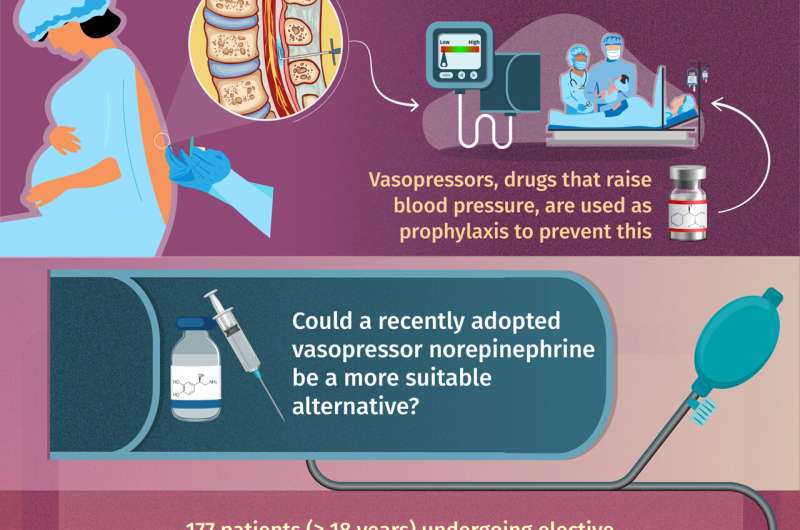
Today, deliveries via cesarean sections (or c-sections) have become quite common globally. Sometimes, c-sections are a medical necessity when normal deliveries become risky either for the mother or the baby. At other times, it can be a choice. C-sections today have become considerably safer procedures than they were a few decades ago, but there is need to refine them further.
In a recent study published in Chinese Medical Journal, researchers from China have settled the debate on one important aspect of refining the procedure: the choice of drug to counteract the side effects of the spinal anesthesia required.
C-sections are performed under general anesthesia or spinal anesthesia. With the latter, there can be one key complication: hypotension, or low blood pressure. This can simply make the mother nauseous, or it can have graver consequences such as compromising the fetus. To avoid these problems, medical practitioners typically administer vasopressors, drugs meant to raise the blood pressure to normal levels, as preventatives before giving the spinal anesthesia.
However, a commonly used vasopressor, ephedrine, can have undesirable effects; some on the fetus, such as increasing fetal heart rate and causing fetal acidosis (a condition in which the proportion of acids in the bodily fluids rises). Studies have also shown that it is slow-acting. Recently, an alternative has begun to be employed: norepinephrine. Norepinephrine has shown fewer effects on the heart rate and is faster acting, making it potentially a better alternative to ephedrine. But to date, there are few head-to-head comparisons of the two.
To understand whether norepinephrine really is the better choice, the team of researchers from China, led by Dr. Zhi-Hong Lu of the Department of Anesthesiology and Perioperative Medicine at the Fourth Military Medical University in Shanghai, conducted a clinical trial.
They enlisted 177 expecting mothers scheduled to undergo c-sections and randomly divided them into groups receiving one of two protocols: norepinephrine infusion for 30 minutes just before spinal anesthesia or a quick dose of ephedrine just before the spinal anesthesia. These are standard protocols for administering these vasopressors.
The team then evaluated various factors like the incidence of hypotension within 30 minutes of spinal anesthesia administration, the conditions of the mother and baby 30 minutes after spinal anesthesia, and the degree of oxygenation in the cerebral region—the uppermost part—of the baby’ brain 10 minutes after birth.
They found that fewer mothers who had received norepinephrine suffered from hypotension than those who received ephedrine. Similarly, the frequency of tachycardia, a condition characterized by irregularly fast heartbeats, was lower in mothers given norepinephrine than those administered with ephedrine. The former were also less likely to experience nausea and vomiting.
As for the physical condition of the newborn, including heart rate, effort required for respiration, tone of muscles, stimulation response, and coloration of skin, there weren’t significant differences between the two groups. The cord blood gas levels, which indicate metabolic conditions in the newborn, weren’t different between the two groups either.
One exception to this trend in newborns, or neonates, was the cerebral oxygenation level. As Dr. Lu has explained, “Neonatal cerebral regional saturations were significantly higher after birth in the norepinephrine group than in the ephedrine group. This indicates that norepinephrine can has potential neonatal benefits as well, which ephedrine does not have. The routine use of this norepinephrine regimen could help reduce neonate neurocognitive complications.”
Overall, this study seems to indicate that norepinephrine infusion should be the preferred vasopressor protocol for c-sections. Dr. Lu says, “Further research is required to optimize the regimen to clarify norepinephrine’s neonatal benefits and maximizing them. But for now, it appears that its fixed-rate infusion is more effective than the ephedrine protocol for people undergoing elective c-section.”
Source: Read Full Article
